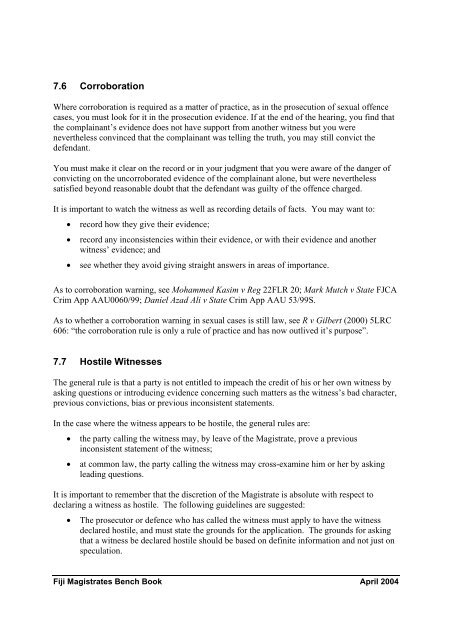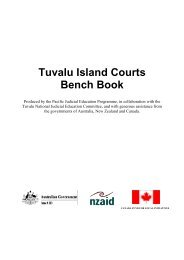Fiji Magistrates Bench Book - Federal Court of Australia
Fiji Magistrates Bench Book - Federal Court of Australia
Fiji Magistrates Bench Book - Federal Court of Australia
Create successful ePaper yourself
Turn your PDF publications into a flip-book with our unique Google optimized e-Paper software.
7.6 Corroboration<br />
Where corroboration is required as a matter <strong>of</strong> practice, as in the prosecution <strong>of</strong> sexual <strong>of</strong>fence<br />
cases, you must look for it in the prosecution evidence. If at the end <strong>of</strong> the hearing, you find that<br />
the complainant’s evidence does not have support from another witness but you were<br />
nevertheless convinced that the complainant was telling the truth, you may still convict the<br />
defendant.<br />
You must make it clear on the record or in your judgment that you were aware <strong>of</strong> the danger <strong>of</strong><br />
convicting on the uncorroborated evidence <strong>of</strong> the complainant alone, but were nevertheless<br />
satisfied beyond reasonable doubt that the defendant was guilty <strong>of</strong> the <strong>of</strong>fence charged.<br />
It is important to watch the witness as well as recording details <strong>of</strong> facts. You may want to:<br />
• record how they give their evidence;<br />
• record any inconsistencies within their evidence, or with their evidence and another<br />
witness’ evidence; and<br />
• see whether they avoid giving straight answers in areas <strong>of</strong> importance.<br />
As to corroboration warning, see Mohammed Kasim v Reg 22FLR 20; Mark Mutch v State FJCA<br />
Crim App AAU0060/99; Daniel Azad Ali v State Crim App AAU 53/99S.<br />
As to whether a corroboration warning in sexual cases is still law, see R v Gilbert (2000) 5LRC<br />
606: “the corroboration rule is only a rule <strong>of</strong> practice and has now outlived it’s purpose”.<br />
7.7 Hostile Witnesses<br />
The general rule is that a party is not entitled to impeach the credit <strong>of</strong> his or her own witness by<br />
asking questions or introducing evidence concerning such matters as the witness’s bad character,<br />
previous convictions, bias or previous inconsistent statements.<br />
In the case where the witness appears to be hostile, the general rules are:<br />
• the party calling the witness may, by leave <strong>of</strong> the Magistrate, prove a previous<br />
inconsistent statement <strong>of</strong> the witness;<br />
• at common law, the party calling the witness may cross-examine him or her by asking<br />
leading questions.<br />
It is important to remember that the discretion <strong>of</strong> the Magistrate is absolute with respect to<br />
declaring a witness as hostile. The following guidelines are suggested:<br />
• The prosecutor or defence who has called the witness must apply to have the witness<br />
declared hostile, and must state the grounds for the application. The grounds for asking<br />
that a witness be declared hostile should be based on definite information and not just on<br />
speculation.<br />
<strong>Fiji</strong> <strong>Magistrates</strong> <strong>Bench</strong> <strong>Book</strong> April 2004
















